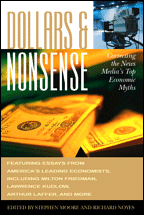 |
||||||||||||||||||||||||
|
||||||||||||||||||||||||
 |
||||||
|
||||||
 |
||||||||||||||||||
|
||||||||||||||||||
 |
|||||||||
|
 |
||||||||||||||||||||||||
|
||||||||||||||||||||||||
 |
||||||||||||||||||||||||
|
||||||||||||||||||||||||
Correcting the News Media's
Top Economic Myths
Milton Friedman, Lawrence Kudlow, Arthur Laffer, and More
Stephen Moore and Richard Noyes
|
America's free market system is responsible for our great prosperity and national strength, but news coverage often gives citizens a negative view of our country's basic economic system. In Dollars & Nonsense, ten distinguished economists clearly and concisely present the truth about some of the media's most common misrepresentations of economic fact and theory, and show reporters how to do a better job in the future. Experts such as Milton Friedman, Lawerence Kudlow and Arthur Laffer explain that, contrary to what you may see on television, government spending does not promote economic expansion, economic growth does not fuel inflation, and lower tax rates often create more government revenues.
Mark Twain once quipped to an adversary he was debating: “It’s not what you don’t know that’s so dangerous. It’s the things you think you know that just ain’t so.” After all, the public’s demand for first-rate economic and financial news and analysis has never been greater, thanks to the burgeoning new investor class of Americans. Twenty years ago, only about one in six American households owned stock. Today more than half do. The real financial wealth of the typical American household has more than doubled in the past 15 years. Business ownership rates, especially among women, have tripled since 1980. The news media do a respectable job of reporting the hard facts – the Federal Reserve’s interest-rate changes, unemployment reports, and stock market updates. But economic journalism is deficient in explaining and analyzing the how and why of our modern market economy. Perhaps the most pervasive and infuriating fallacy is that good economic news is portrayed as bad news and bad economic news is seen as good news. The public is force-fed this crazy, upside-down storyline virtually every day. We are inundated with nonsensical headlines like the following:
The public reacts to such “news” by scratching their heads in total bafflement, as well it should. None of the above headlines makes any sense whatsoever. For the past 15 years.........continued
Home | News Division
| Bozell Columns | CyberAlerts |





